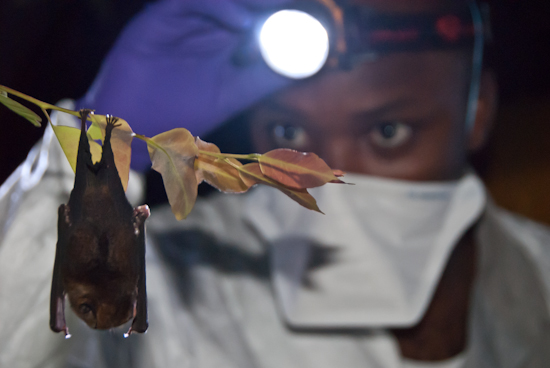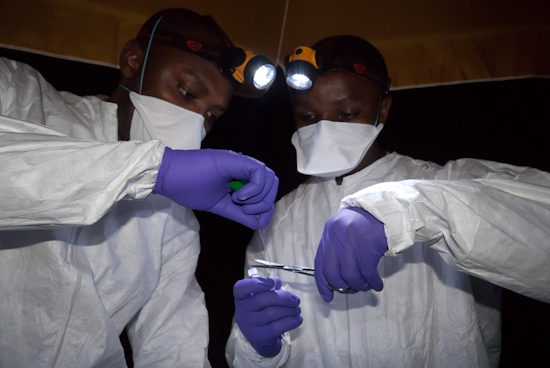Tackling Infectious Disease Outbreaks
By Gorilla Doctors Staff on Saturday, October 22nd, 2011 in Uncategorized. Dr. Julius finds a bat.By Molly Feltner, MGVP Communications Officer
Dr. Julius finds a bat.By Molly Feltner, MGVP Communications Officer
2011 marked the second year of PREDICT, the USAID-funded project led by the UC Davis Wildlife Health Center investigating emerging infectious diseases in wildlife in Uganda and Rwanda. Our PREDICT staff, who are dedicated to finding new diseases that could transfer from wildlife to humans, have collected thousands of samples from rodents, primates, and other animals living in and around Rwanda and Uganda’s national parks. Through partnerships with the Ugandan and Rwandan governments and Makerere University, MGVP has helped improve the capacity to store, process, and test wildlife samples in in-country laboratories.
 Dr. Julius and Dr. Olivier.Dr. Julius Nziza manages the PREDICT program in Rwanda and is supported by Field Assistant Dr. Olivier Nsengimana. This year, the team spent a lot of time in the field collecting samples in areas around Rwanda’s national parks where people and wild animals might come into contact. They collected biological samples from rodents and chimps in Nyungwe National Park, bats living in people’s homes near Akagera National Park, and bats living in caves near Volcanoes National Park. The samples are being stored in a bio bank at RARDA while we work to establish a laboratory in Kigali.
Dr. Julius and Dr. Olivier.Dr. Julius Nziza manages the PREDICT program in Rwanda and is supported by Field Assistant Dr. Olivier Nsengimana. This year, the team spent a lot of time in the field collecting samples in areas around Rwanda’s national parks where people and wild animals might come into contact. They collected biological samples from rodents and chimps in Nyungwe National Park, bats living in people’s homes near Akagera National Park, and bats living in caves near Volcanoes National Park. The samples are being stored in a bio bank at RARDA while we work to establish a laboratory in Kigali.
In Uganda, PREDICT Country Coordinator Dr. Benard Ssebide and Field Assistant Dr. Racheal Mababazi work closely with the Uganda Wildlife Authority, Makerere University, and the National Task Force on Epidemic Preparedness and Response in the Ministry of Health and Ministry of Agriculture. They have collected close to 1000 samples from rodents, primates, hippos, birds, and bush pigs to be analyzed at the Makerere University Walter Reed Project Influenza Research Laboratory (MUWRP).
Earlier in the year, Drs. Benard, Julius, and Mike traveled to Northern Uganda to investigate the role animals may have played in a yellow fever outbreak. Later, Dr. Benard responded to an Ebola outbreak in Central Uganda. Some of the samples were analyzed by the Uganda Virus Research Institute with support from the Center for Disease Control and many are undergoing analysis at the MUWRP lab, where the PREDICT staff has added more storage freezing capacity and biosafety equipment.
Also in Uganda, PREDICT, the Uganda Wildlife Authority, and the Smithsonian Institution are pilot testing an animal mortality monitoring and reporting system in Queen Elizabeth Conservation Area as an early warning system detect potential epidemics.
Please consider supporting MGVP by making a secure online donation. Every dollar you give goes to directly supporting our gorilla health programs and One Health initiative. Thank you for your generosity.
For the most up-to-date information about the Gorilla Doctors, “like” our Facebook page. You’ll find gorilla health reports, news items, photos, videos, and links to related content.


 Donate
Donate